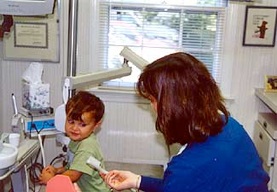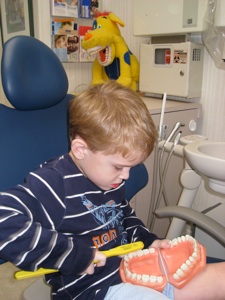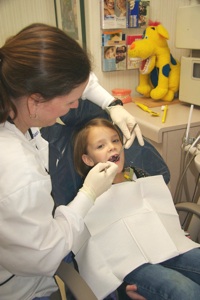
We have developed a series of age-appropriate protocols for children as they pass through the many developmental stages between their first dental visit (usually between ages two and three) and adulthood. These guidelines are flexible, and can be adapted to the needs of each child.
Caring For Your Baby’s Teeth
It’s never too early to begin good oral health practices. Here are the first steps you can take to give your baby a lifetime of healthy teeth.
•Start cleaning your baby’s mouth a few days after birth.
•After every feeding, wipe baby’s gums with a damp washcloth to remove plaque.
•When teeth appear, clean them with a soft-bristled brush and warm water.
•By age three your child can brush his or her own teeth, with parental supervision, using a soft children’s toothbrush with a pea-size amount of toothpaste. Take turns brushing to ensure teeth are being properly cared for.
•Avoid baby bottle tooth decay. Don’t let your baby fall asleep while sucking a milk- or juice-filled bottle. Put only water in bedtime bottles.
•Fluoride helps fight cavities. Your dentist or pediatrician can tell you if your child needs a fluoride supplement.

Schedule your child’s first dental visit by his or her third birthday.
A child’s first dental visit, usually by his or her third birthday, should establish the groundwork for a lifetime of proper dental care. You can encourage a positive attitude toward that visit by following these tips:
•Take your child when you visit your dentist so he or she can get used to the office and staff.
•Play dentist to familiarize your child with what will happen. Count your teeth is another game you can play.
•Read you child stories about dental visits.
•Answer questions honestly, but not too specifically. Avoid negative words like hurt.
•We have an explanatory video that you can check out and view before your first visit.
When your two to five year old child visits us for the first time we will:
•Check for early signs of decay or developmental problems.
•Answer your questions and explain exactly how to care for your child’s teeth.
•Explain to your child what carries are and how they are caused, and how to achieve good dental health through regular check ups, tooth brushing, and good diet.
•Present a certificate of agreement to you and your child.
Thereafter, most children should visit a dentist every six months.

When Your Six to 14 Year Old Child Visits Us
As your child grows older, we will encourage her or him to take responsibility for their own dental health. We will teach your child about plaque, how to brush and floss properly, and about the importance of good nutrition. During regular checkups we will:
• Perform a thorough examination and assess the need for an orthodontic consultation.
• Take any necessary radiographs at about age seven.
• Protect Pre-molars and second molars, which come in between ages 10 and 13, against decay with sealants.
• Teach your child about plaque, how to brush and floss properly, and about the importance of good nutrition. We suggest the use of electric toothbrushes and flossers and other easy ways to make brushing fun. Using a timer will help your child know how long to brush.

We will perform an examination, including appropriate X-rays, and update your teen’s medical history.
If applicable, we will check orthodontic status.
When appropriate we will apply sealants and fluoride treatment.
We will address any concerns your teen may have, and the importance of good oral health habits:
• Brush and floss regularly, especially if wearing braces
• Eat a healthy diet, avoiding junk foods, candy, sugared gum, and soft drinks
• Always wear a mouth guard when playing contact sports
• Avoid tobacco in any form, especially smokeless tobacco
Young Athletes Should Always Wear a Mouth Guard
What body part suffers most during contact sports? Surprisingly, it’s the mouth! To ensure your child’s safety while playing sports such as football, soccer, hockey, or lacrosse insist that a mouth guard, custom molded by your dentist, always be worn.
Boil-and-bite guards often don’t stay put, can be uncomfortable, and thus are not worn. A custom-molded guard is comfortable and will not interfere with speech or breathing. It offers the best protection against tooth loss, or other injury to the mouth or jaw.
Wisdom Teeth
Wisdom teeth, or third molars, usually appear between ages 17 and 21. Healthy wisdom teeth are an asset. However, they can often cause problems.
When the jaw isn’t large enough, wisdom teeth can become impacted growing sideways, emerging only part way, or remaining trapped beneath the gum and bone.
Since impacted wisdom teeth can damage adjacent teeth and cause infection and pain, removal is often recommended. Dr. David Ferguson can usually extract wisdom teeth here in our office. For more difficult we can refer you to a specialist.
This should be considered as early as possible, since younger patients generally experience fewer complications, and heal more quickly.
